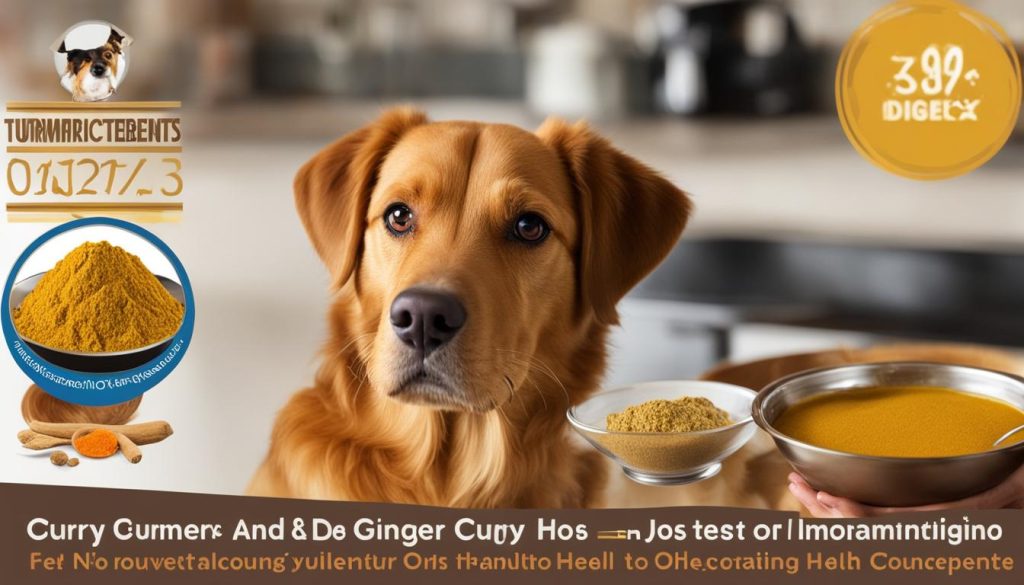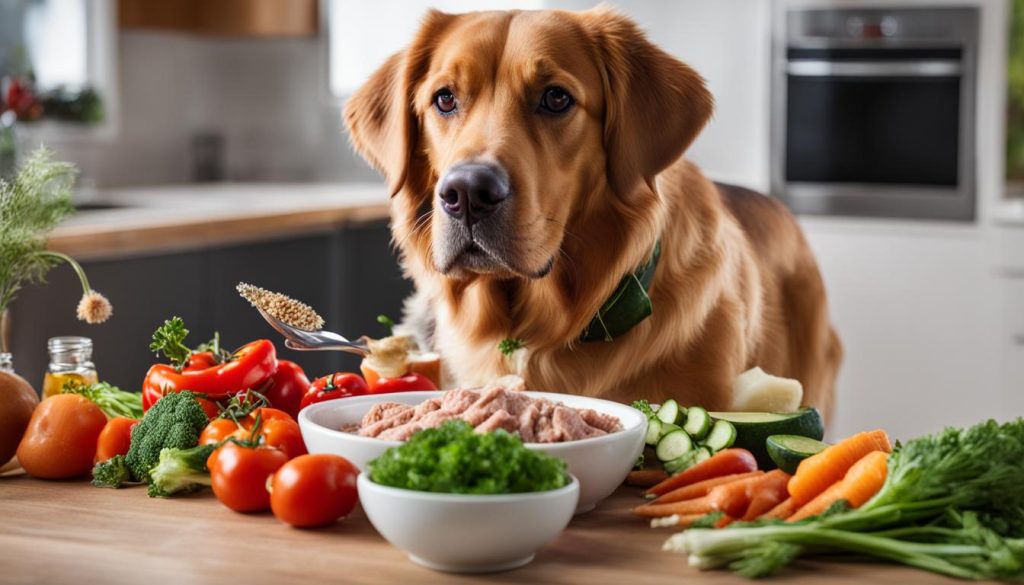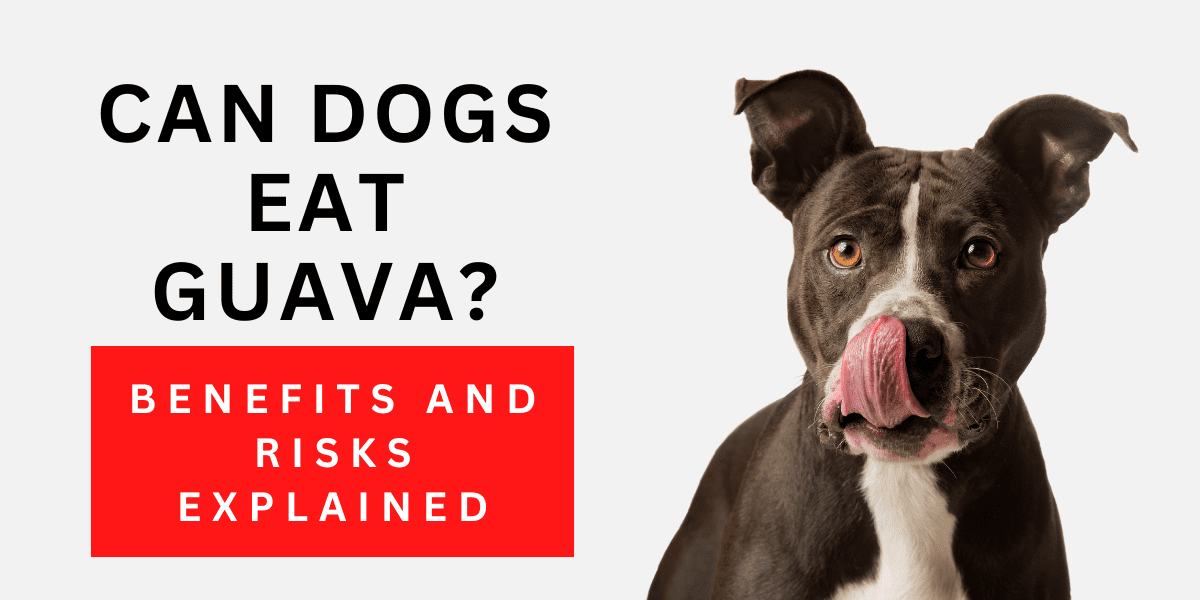As a devoted dog owner, ensuring the safety of their diets is one of my top priorities. It’s tempting to share our favorite meals with our furry friends, but does that include the aromatic dishes we often relish? Specifically, can dogs eat curry, and what are the health effects of curry on dogs? With the rising popularity of varied cuisines in the United States, it’s become increasingly common to ponder over the suitability of such flavorful dishes for our pets. Inherent in this query is not just a concern for pet food safety, but also a potent need to comprehend the dietary difference between us and our canine companions.
I’ve always believed that being informed is the first step to responsible pet ownership. Canines, with their different metabolism and digestive systems, may react unusually to certain human foods. Curry, being a complex concoction of spices and ingredients, might present more than just a spicy kick to our dogs; it could potentially carry risks that we, as caring dog owners, should be aware of.
Let us delve into the nuances of feeding curry to dogs, thereby ensuring that we are providing not only a loving home but also the utmost care in what we let our beloved partners in life consume.
Can Dogs Eat Curry? No, they can’t. It is not ideal.
- Understanding the dietary needs and restrictions of dogs is essential for their well-being.
- Curry may pose health risks to dogs due to its complex mixture of ingredients and spices.
- Recognizing what human foods are safe for dogs is crucial to avoid unintended harm.
- Being informed on pet food safety can help prevent adverse health effects of curry on dogs.
- Consulting a veterinarian about your dog’s diet is always the safest approach.
The Dangers of Feeding Curry to Dogs
As a devoted dog owner, my journey has led me to carefully scrutinize the meals I share with my furry companion, alerting me to the possible dangers lurking within certain human favorites. Despite its tantalizing aroma and rich flavors, I’ve come to understand that curry is a dish best kept away from dogs. Let’s explore why this staple might be problematic for our canine friends.
Ingredients in Curry That Are Toxic to Dogs
I’ve learned that many curries contain onions and garlic; both are a no-go for dogs. These ingredients carry substances called thiosulfates, which are harmless to humans but can be toxic for dogs. A dog consuming these can suffer from oxidative damage to red blood cells, leading to anemia. Realizing that even small amounts could pose a threat, I’ve made it a rule to avoid sharing anything containing these toxic ingredients with my dog.
Health Effects of Curry Spices on Dogs
In my research on whether is curry safe for dogs, I’ve discovered that the spices we often enjoy for their health benefits in humans can have the opposite effect on dogs. Several curry spices, including turmeric and cumin, might seem harmless, but others, notably chili powder, could trigger significant digestive upsets in dogs. It’s evident that it’s not just about avoiding one ingredient; the overall spice blend in curry can negatively impact my dog’s health.
Risks of Gastrointestinal Distress from Spicy Foods
Then there’s the issue of dogs and spicy curry. Canines aren’t accustomed to the heat and complexity of spices that many curries contain. Ingredients like chili peppers can be particularly harmful, leading to stomach pain, diarrhea, and vomiting. Not to mention the long-term implications – chronic ingestion of spicy foods could lead to severe conditions such as pancreatitis, which is why I keep my dog’s diet simple and spice-free.
It’s clear that for me, curry and dogs digestion care must go hand-in-hand. Recognizing the ingredients that can cause harm is the first step towards ensuring that my dog remains happy, healthy, and free from gastrointestinal distress. By opting for dog-safe alternatives, I can enjoy my curry without sharing, keeping my pet’s tail wagging for the right reasons.
Understanding What Foods Are Safe for Dogs
As a dedicated pet guardian, I always strive to ensure what’s on my dog’s plate is as beneficial and safe as possible. While the query ‘can dogs have curry’ often pops up among pet communities, it’s vital we understand that foods like curry may not always be the best choice for our furry friends. Instead, focusing on dog-approved snacks and meals can provide a world of delicacies without the worries.
Nutritionally Appropriate Treats for Canines
Often when I ponder the kind of treats to serve, I aim for health-promoting snacks. Instead of adventurous yet potentially harmful foods like curry, I look towards safe treats for dogs that can include a variety of vet-approved chews and kibbles designed with canine nutrition in mind. These treats not only satisfy their taste buds but also contribute positively to their dietary needs.
Fruits and Vegetables Dogs Can Safely Consume
Sometimes, I like to spice things up with natural goodies. In place of dogs and curry, I transition to fruits and vegetables for dogs, which can be a refreshing and safe alternative. Apples (without the seeds), blueberries, carrots, and sweet potatoes are often in my dog’s snack inventory—all of which provide a wealth of vitamins and minerals, and what’s more, they thoroughly enjoy them!
Identifying Foods That Can Cause Allergic Reactions in Dogs
In my journey with my canine companion, I’ve learned to be vigilant about dog food allergies. It starts with close observation for symptoms like itching or digestive discomfort after new foods are introduced. By keeping a food diary for my dog, I’ve managed to pinpoint foods that don’t agree with him, ensuring his meals are not just nourishing but also gentle on his system.
Exploring the Contents of Curry
As someone who’s always been passionate about not only the flavors of curry but also the well-being of our canine friends, I find it crucial to scrutinize what goes into our beloved curry dishes. The medley of spices that bestow that rich flavor we all admire could potentially be a source of concern for dog owners.
The Role of Garlic and Onions in Curry Dishes
Let’s take a moment to talk about garlic and onions. These staples of curry recipes are loved for their ability to enrich the aroma and deepen the taste. However, these same ingredients contain thiosulfate, a compound that’s harmless to us humans but a real peril for dogs. Ingesting garlic and onions in curry could lead to a dangerous condition known as hemolytic anemia in our furry companions.
How Certain Spices Can Affect Dog Digestion
Curry spices and dogs is a combination that should be handled with care. Many spices, like turmeric or cinnamon, may offer some health benefits but certainly not when mixed within a complex curry dish. These spices, coupled with the rich, fatty bases often present in curry, can wreak havoc on a dog’s digestive system, leading to discomfort, and in some cases, more serious conditions.
Can Dogs Tolerate Curry Spices?
The question ‘can dogs tolerate curry?’ is one that requires our attention. While small amounts of certain spices might not be immediately harmful, the combined effect of a spice-rich curry dish is a different story. The truthful answer is that dogs and curry spices are not the best match, and it’s our responsibility to protect our dogs from potential health risks that stem from curry’s complex assortment of ingredients.
Can Dogs Eat Curry? Breaking Down The Myth
As someone who loves both dogs and the rich flavors of international cuisine, I often find myself in the kitchen pondering over ingredients, especially when making curry. But when my furry companion trots in, his nose twitching at the aroma, the question arises: is curry for dogs a safe choice? Contrary to the popular belief that our canine friends can enjoy the same spicy treats we do, there are inherent risks in sharing this savory dish with them.

The truth about curry for dogs is that it’s not just about a single spice or ingredient. Curry is a complex blend of many components, many of which can have detrimental health effects on dogs. From the staple garlic and onions that can lead to anemia, to dairy products that many dogs find indigestible, curry can be a Pandora’s box of problems for our four-legged pals. It’s a misconception spread far and wide, perhaps from watching pups beg for just a taste of our plates, but as responsible pet owners, we must sidestep these myths for the sake of our pet’s health.
Understanding that dogs have singular dietary needs which don’t encompass the rich, varied flavors of curry, it’s essential for us to stick to foods that are formulated for their well-being. As I delve deeper into pet nutrition, it becomes clear that while we enjoy the occasional spicy extravagance, our furry family members are better off without it.
Alternative Dog-Friendly Food Options
As a dedicated dog parent, I’m always exploring new ways to spice up my pup’s diet while making sure I’m using dog-friendly herbs and spices. It’s crucial to favor seasonings that are not only safe but also beneficial for our furry friends. In my kitchen, I’ve found that a sprinkle of parsley can freshen up any dog dish, and a hint of basil can make homemade dog recipes even more enticing for my canine companion.
Safe Herbs and Spices for Dogs
When it comes to incorporating herbs and spices into my dog’s meals, I rigorously stick to those that are recognized as dog-safe. Herbs like thyme and turmeric are not only safe but offer health benefits, with thyme providing a good source of vitamins and turmeric being known for its anti-inflammatory properties. These dog-friendly herbs and spices are an excellent way to naturally enhance the flavor of your pet’s meal.
Healthy Homemade Dog-Friendly Recipes
I’ve found joy in crafting homemade dog recipes that are perfect for my dog’s taste buds and nutritional needs. A favorite is a simple combination of cooked lean meats like turkey or chicken, mixed with vegetables such as carrots and green beans. For a special treat, I’ll bake sweet potato bites that are rich in beta-carotene, which is great for my dog’s vision and immune system. These recipes keep my pooch healthy and happy!
Recommended Dog-Safe Human Foods
While some human foods are a strict no-no, many are actually beneficial for dogs. I often turn to dog-safe human foods like plain, boiled chicken or pumpkin when I want to give my dog something special. These foods offer a comforting taste of human cuisine without any health risks. Whenever I’m in doubt, I check with my vet to make sure what I’m serving is safe for my dog.
How to Spot and Respond to Food Allergies in Dogs
As a diligent dog owner, understanding the signs of food allergies in dogs is pivotal for their health and happiness. Recognizing the symptoms of food allergies could save your furry friend from a great deal of discomfort, or even danger. Let’s look at how to identify and handle an allergic reaction in dogs.
Common Symptoms of Food Allergies in Canines
When it comes to allergic reactions, dogs often manifest certain signs that indicate they’re not responding well to something they’ve eaten. If you observe your dog excessively itching or scratching, developing red or inflamed skin, or experiencing gastrointestinal issues such as vomiting or diarrhea, these could be clear indicators of a food allergy. Chronic ear infections, paw biting, and even fur loss can also be associated with this condition. Recognize these symptoms early to avoid exacerbation of their allergies.

Steps to Take if Your Dog Has an Allergic Reaction
Once you’ve spotted signs of an allergic reaction, it’s essential to act swiftly. My first piece of advice is to stop feeding your dog the suspected allergen immediately. Note the onset of symptoms in relation to mealtime to help isolate the cause. Then, I recommend consulting your veterinarian without delay. They might suggest an elimination diet to pinpoint the exact allergy, prescribe medication to relieve symptoms, or advise allergy testing for a comprehensive understanding. Remember, prompt and proper care is the key to ensuring your dog’s well-being.
Conclusion
In our heartfelt journey through the dos and don’ts of pet nutrition, we’ve navigated the piquant seas of curry and its hidden perils for our dogs. As a dedicated pet parent, I’ve learned that responsible pet feeding is not only about love, but about knowledge and restraint. It’s about understanding that our furry companions thrive on a balanced dog diet, strikingly different from our own, and that their health hinges on our ability to choose the right foods for their delicate systems.
Key Takeaways for Responsible Pet Feeding
I grasp now more than ever the crucial role that diet plays in maintaining our pets’ health. While the tantalizing flavors of curry titillate our taste buds, we’ve discovered that such complexity can be detrimental to dogs. Responsible pet feeding means recognizing that ‘human food’ is not a one-size-fits-all, and that our culinary delights may not align with the dietary needs of our canine companions. It’s about putting their well-being ahead of the fleeting joy of sharing our meals with them.
Seeking Veterinary Advice for a Balanced Dog Diet
Throughout these revelations, the constant beacon has been the expertise of our trusted veterinarians. Seeking veterinary advice is paramount to crafting a diet that fulfills the nutritional exigencies of each unique dog. They are the knowledgeable partners we need to ensure our beloved pets enjoy a vibrant, healthy life. It is this alliance that will ultimately guide us towards making informed, compassionate choices for those who depend on us the most – our cherished dogs.
FAQ
Can dogs eat curry?
I’d advise against it. Curry often contains ingredients that are not safe for dogs, including spices like garlic and onions, which can be toxic to them. Additionally, the spices in curry can cause gastrointestinal upset or even more serious health issues for your furry friend.
What ingredients in curry are toxic to dogs?
Certain curry ingredients to be on the lookout for include onions, garlic, chives, and sometimes raisins or grapes. These foods contain thiosulfate or other compounds that can lead to anemia in dogs by damaging their red blood cells. Even small amounts can be harmful, so it’s best to keep curry off your dog’s menu.
Are curry spices harmful to dogs?
Yes, they can be. Many curry spices, such as chili powder, nutmeg, and black pepper, can be too harsh for a dog’s digestive system, leading to irritation, vomiting, or diarrhea. Keeping spicy and aromatic foods away from dogs is generally a good rule to follow for their health.
How does spicy food like curry affect a dog’s digestion?
Spicy food, including curry, can cause significant gastrointestinal distress for dogs. They are not used to spicy foods, and their digestive systems can become irritated by the heat and certain spices, resulting in discomfort, vomiting, or diarrhea.
What treats are nutritionally appropriate for dogs?
Nutritionally appropriate treats for dogs include those made with simple, wholesome ingredients such as lean meats, certain fruits and vegetables, and grains that are safe for dogs. Always choose treats specifically formulated for dogs to ensure they are getting the nutrition they need without any harmful additives.
Which fruits and vegetables can dogs safely consume?
Dogs can safely consume many fruits and vegetables, including apples (without seeds), carrots, green beans, cucumbers, and blueberries. These can make for healthy, low-calorie treats. However, remember to serve them in moderation and without any added sugars or spices.
How can I identify foods that could cause allergic reactions in my dog?
Pay attention to your dog’s reaction after trying a new food. Signs of an allergic reaction can include itching, excessive licking, vomiting, diarrhea, or a change in appetite or energy levels. If you suspect an allergy, eliminate the new food item and consult with your vet.
Are garlic and onions in curry harmful to dogs?
Absolutely. Garlic and onions contain substances that are toxic to dogs and can result in hemolytic anemia. Even small quantities, such as those found in curry dishes, can be harmful. It’s best to avoid feeding your dog any foods containing these ingredients.
Can dogs tolerate any spices from curry?
Most spices in curry are not recommended for dogs. Dogs have different dietary needs and sensitivities than humans. However, certain mild spices like turmeric can be beneficial in very small amounts, but consult with your vet before adding any spices to your dog’s diet.
Are there safe herbs and spices I can add to my dog’s food?
Yes, there are several safe herbs and spices you can add to your dog’s food, like parsley, which can freshen breath, and basil, which has antimicrobial properties. Always use these in moderation and consult with your vet first to ensure they’re appropriate for your dog’s diet.
What are some healthy homemade recipes for dogs?
Healthy homemade recipes for dogs can include cooked lean meats like chicken or turkey, plain rice, pumpkin, and vegetables like green beans or carrots. Always ensure that any homemade dishes are free of harmful ingredients and are appropriate for your dog’s specific dietary needs.
Can you recommend some human foods that are safe for dogs?
Certainly! Plain, cooked meats such as chicken or beef (without any seasoning), white or brown rice, and vegetables like carrots and green beans are great options. Always double-check with your vet first, as each dog’s health and dietary requirements can vary.
How can I spot food allergies in my dog?
Keep an eye out for symptoms like itchy skin, hives, swelling, obsessive licking, vomiting, or diarrhea. Should these arise after introducing a new food, it may be indicative of an allergy and warrants a visit to the vet to determine the cause and proper treatment.
What steps should I take if my dog has an allergic reaction to food?
If your dog has an allergic reaction to food, promptly remove the suspected allergen from their diet and consult with your veterinarian. They may recommend an elimination diet to pinpoint the offending food or prescribe medications to alleviate the symptoms.
Is it really not safe to feed my dog any curry at all?
It’s best to err on the side of caution and avoid giving your dog any curry, as it usually contains ingredients that are potentially dangerous to them. If you want to share your food with your pet, opt for dog-safe alternatives instead.






